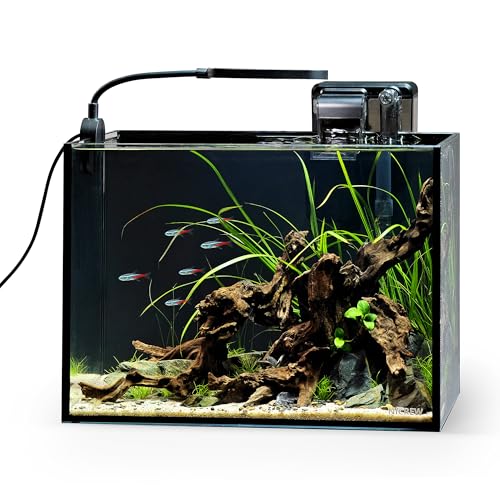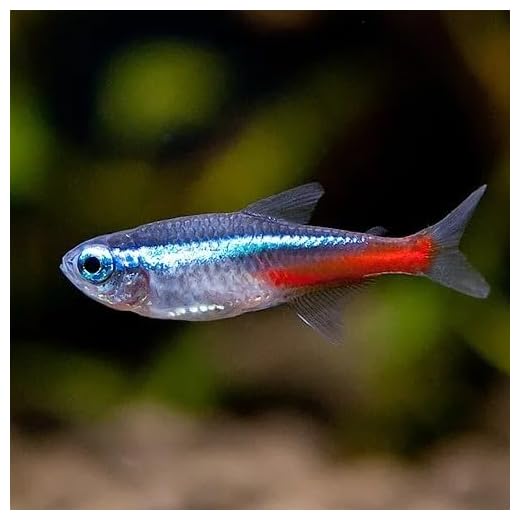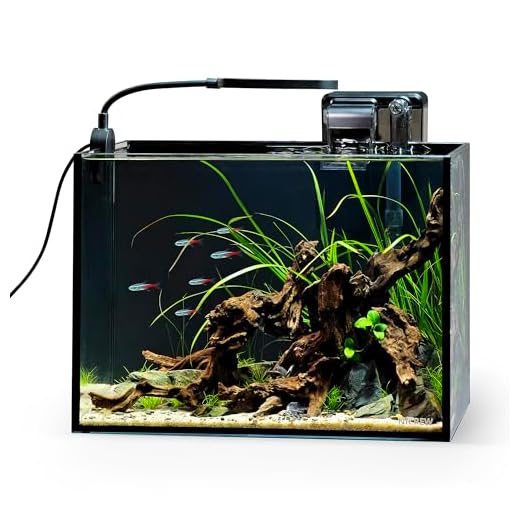Reef
Blog
What can go in a tank with betta fish

Betta fish, also known as Siamese fighting fish, are popular pets due to their vibrant colors and flowing fins. While bettas can survive in small bowls or vases, they thrive in larger tanks with proper filtration and heating. If you have a betta fish and are wondering what other tank mates can coexist peacefully with them, there are a few options to consider.
Snails are a great choice for a betta tank. They help to clean up the tank by eating excess food and algae. Some popular snail species that are compatible with bettas include nerite snails and mystery snails. These snails are peaceful and won’t bother your betta.
Shrimp can also be kept with betta fish, but it’s important to choose the right species. Amano shrimp and cherry shrimp are two common choices that can coexist with bettas. However, larger species like ghost shrimp may become a target for your betta fish, so it’s best to avoid them.
If you want to add some color and movement to your betta tank, consider adding a school of small fish. Neon tetras, rasboras, and guppies are all compatible with bettas. Just make sure to keep an eye on the behavior of your betta as some individuals may be more aggressive towards tank mates.
In conclusion, betta fish can live with snails, certain species of shrimp, and small schooling fish. It’s important to research the specific needs and requirements of each tank mate before introducing them to ensure a harmonious and thriving aquarium environment. Remember to always monitor the behavior of your betta and provide ample hiding spots and territory for each tank inhabitant.
Benefits of Keeping Betta Fish
Keeping betta fish as pets can offer several benefits:
| 1. Beautiful and Striking Colors: | Betta fish are known for their vibrant and eye-catching colors, which can add beauty and visual interest to any aquarium. |
| 2. Low Maintenance: | Betta fish require minimal care compared to other pet fish. They do not need elaborate filtration systems, and their tanks can be easily cleaned and maintained. |
| 3. Ability to Live in Small Spaces: | Betta fish can thrive in small tanks or bowls, making them a suitable pet for those with limited space. |
| 4. Interactive Pets: | Betta fish are known for their curious and interactive nature. They can recognize their owners and may even learn to perform tricks. |
| 5. Natural Stress Relief: | Watching fish swim peacefully in an aquarium has a calming effect and can help reduce stress and anxiety. |
| 6. Educational Value: | Keeping betta fish can be a great way to introduce children to the concepts of responsibility, care, and the natural environment. |
Overall, betta fish make great pets due to their striking appearance, low maintenance requirements, ability to live in small spaces, interactive nature, stress-relieving qualities, and educational value.
Compatible Tank Mates for Betta Fish
When considering tank mates for your betta fish, it’s important to choose species that will coexist peacefully. While bettas are known for their aggressive nature and territorial behavior, there are certain fish that can live harmoniously with them in a community tank.
Choosing Peaceful Tank Mates
One of the key factors in selecting tank mates for your betta fish is choosing species that are peaceful and non-aggressive. Avoid aggressive fish such as cichlids, goldfish, or other fin-nipping species. Instead, look for smaller, calm, and community-oriented fish that can handle the occasional display of aggression from the betta.
Recommended Tank Mates for Betta Fish
Here are some compatible tank mates that have been known to coexist peacefully with bettas:
| Fish Species | Notes |
|---|---|
| Neon tetras | These small, school-oriented fish can add color and activity to the tank. They are generally peaceful and can handle the betta’s aggression. |
| Corydoras catfish | These bottom-dwelling fish are peaceful and can help keep the tank clean. They are social by nature and prefer to be kept in groups. |
| Mystery snails | These snails are a popular addition to betta tanks. They are peaceful, contribute to the tank’s ecosystem, and help with algae control. |
| Guppies | Male guppies can coexist with bettas as long as they have plenty of hiding spots. However, it’s best to avoid keeping female guppies with bettas, as they may be mistaken for other male bettas and become targets of aggression. |
Remember, every betta has its own personality, so it’s important to monitor their behavior after introducing tank mates. If signs of aggression or stress are observed, it may be necessary to rehome the tank mates or provide additional hiding spots to help maintain harmony in the tank.
Suitable Plants for Betta Tank
Adding live plants to a betta fish tank not only enhances the aesthetics of the environment, but also provides numerous benefits for the betta fish itself. Live plants help in maintaining the water quality, provide hiding spots, and aid in the overall well-being of the fish. However, not all plants are suitable for a betta tank. Here are some plants that are compatible with betta fish:
Anubias
- Anubias plants are perfect for betta tanks because they can withstand a wide range of water parameters.
- They have broad leaves that offer plenty of resting spots for the betta fish.
- These plants can be attached to rocks or driftwood, making them ideal for aquascaping.
Java Fern
- Java ferns are hardy plants that are easy to care for, making them suitable for beginners.
- They can tolerate a variety of water conditions and do not require intense lighting.
- Their feathery leaves provide shade and hiding spots for betta fish.
Amazon Sword
- The Amazon sword is a popular choice for betta tanks due to its vibrant and large leaves.
- This plant helps in maintaining water quality by absorbing nitrates and other harmful substances.
- It requires moderate lighting and a nutrient-rich substrate for optimal growth.
Water Wisteria
- Water wisteria is a fast-growing plant that can quickly fill up space in a betta tank.
- Its delicate, feathery leaves create a beautiful backdrop for the betta fish.
- This plant can thrive in a wide range of water parameters and lighting conditions.
Before adding any plants to the betta tank, it is essential to ensure they are free from pesticides or chemicals. Quarantine the plants if necessary before introducing them to the betta tank. Regularly trim and maintain the plants to prevent overcrowding and ensure the well-being of the betta fish.
Appropriate Tank Decorations for Betta Fish
When it comes to setting up a tank for your betta fish, choosing the right decorations is essential. Not only do they provide visual interest, but they also serve important functions for the fish’s health and well-being. Here are some appropriate tank decorations for betta fish:
1. Plants: Live or artificial plants can provide hiding spots and resting places for betta fish. They also help to create a more natural environment and promote a sense of security for the fish.
2. Caves and Tunnels: Betta fish enjoy exploring and hiding in small spaces. Providing caves and tunnels made of fish-safe materials can give them a sense of security and privacy.
3. Floating Decorations: Floating decorations like logs or leaves can create surface cover for betta fish. They can rest on these decorations and even build bubble nests on them.
4. Smooth Rocks and Stones: Smooth rocks and stones can be used to create hiding spots and add visual interest to the tank. It’s important to choose rocks that won’t harm the fish or alter the water chemistry.
5. Gravel or Sand Substrate: Betta fish are bottom-dwellers, so having a substrate like gravel or sand can mimic their natural habitat and make them feel more at home. Make sure the substrate is smooth to prevent injury to the fish.
Remember, it’s important to choose decorations that have no sharp edges, won’t damage the betta’s delicate fins, and won’t alter the water parameters. Always rinse decorations thoroughly before adding them to the tank to remove any dust or debris.
By providing appropriate tank decorations, you can create a stimulating and comfortable environment for your betta fish, ensuring their health and happiness!
Essential Equipment for Betta Fish Tank
When setting up a tank for your betta fish, it is vital to have the right equipment to create a healthy and safe environment for your pet. Here are some essential items you will need:
- Aquarium Tank: A suitable tank is the foundation of a betta fish’s habitat. A tank with a minimum volume of 5 gallons is recommended to ensure enough space for swimming and comfort.
- Heater: Betta fish are tropical fish and require a consistent water temperature between 76-82°F (24-28°C). A reliable aquarium heater will help maintain the ideal temperature for your betta.
- Filter: A filtration system is crucial to keep the water clean and free from toxins. A gentle filter is suitable for betta fish, as they do not appreciate strong currents.
- Substrate: A substrate, such as gravel or sand, provides a natural environment for your betta fish and helps to anchor live plants. Choose a substrate that is suitable for aquarium use and avoid sharp edges.
- Decorations: Bettas enjoy exploring their environment, so including suitable decorations like caves, plants, and driftwood will help keep them entertained. Ensure that the decorations are safe and do not have any sharp edges or small openings where bettas can get stuck.
- Lighting: While bettas do not require intense lighting, providing a gentle light source will enhance the overall appearance of your tank and can be beneficial for live plants.
- Water conditioner: Tap water contains chlorine and other chemicals that can harm betta fish. A water conditioner helps remove these substances and makes the water safe for your betta.
- Thermometer: Monitoring the water temperature is essential to ensure it stays within the appropriate range. A thermometer will help you keep track of the water temperature.
- Net: Having a net on hand is essential for safely transferring your betta fish or removing debris from the tank without causing stress or harm to your betta.
Remember to regularly maintain the tank by performing water changes, monitoring the water parameters, and keeping an eye out for any signs of illness or stress in your betta fish. With the right equipment and care, your betta fish will thrive in their tank.
Question & Answer
Can betta fish live with other fish?
While it is possible for betta fish to live with other fish in a tank, they are known to be aggressive and territorial in nature. This can lead to fin nipping, stress, and even death for the other fish. It is generally recommended to keep betta fish alone in a tank.
What type of fish can coexist with betta fish in a tank?
If you really want to have other fish in the tank with your betta fish, there are a few compatible choices. Some potential tank mates for bettas include small, peaceful fish such as neon tetras, guppies, and corydoras catfish. However, it’s important to monitor the tank closely and be prepared to separate the fish if any aggression or stress is observed.
Is it safe to keep a betta fish with other species of fish?
Keeping a betta fish with other species of fish can be risky. While there are some species that can coexist with bettas, there is always a chance of aggression and stress. Betta fish are known for their territorial behavior, and they may attack and injure other fish in the tank. It is generally safer to keep bettas alone or with compatible tank mates in a well-planted and spacious tank.
What happens if I put two betta fish together in the same tank?
Putting two betta fish together in the same tank can lead to aggression and fighting. Male betta fish, in particular, are highly territorial and will often fight to establish dominance. This can result in serious injuries and even death for one or both bettas involved. It is best to keep betta fish separate from each other to prevent any harm or stress.
Can betta fish live with snails or shrimp?
Yes, betta fish can generally live peacefully with certain types of snails or shrimp. Some popular choices include nerite snails, mystery snails, and ghost shrimp. However, it is important to note that individual bettas may still exhibit aggressive behavior towards snails or shrimp, so close observation is necessary. Additionally, make sure the tank is well-planted and provides plenty of hiding spots for the snails or shrimp to avoid any potential harm.
What are some tank mates that can live peacefully with betta fish?
There are a few tank mates that can live peacefully with betta fish. Some examples include ghost shrimp, snails, and African dwarf frogs. However, it is essential to research the specific needs and temperament of each species before introducing them to ensure compatibility.







